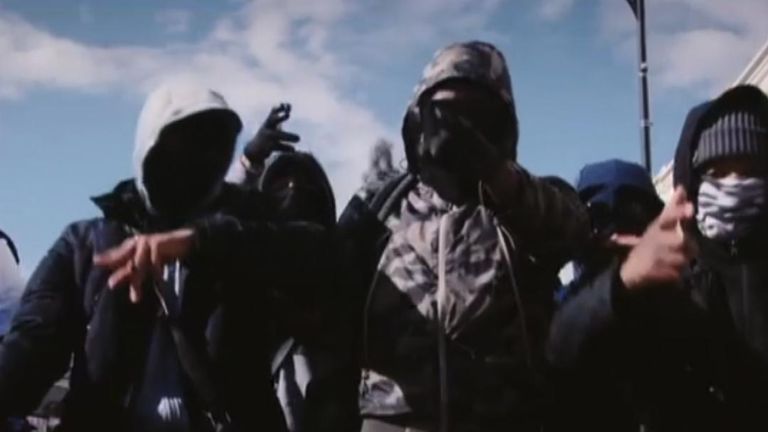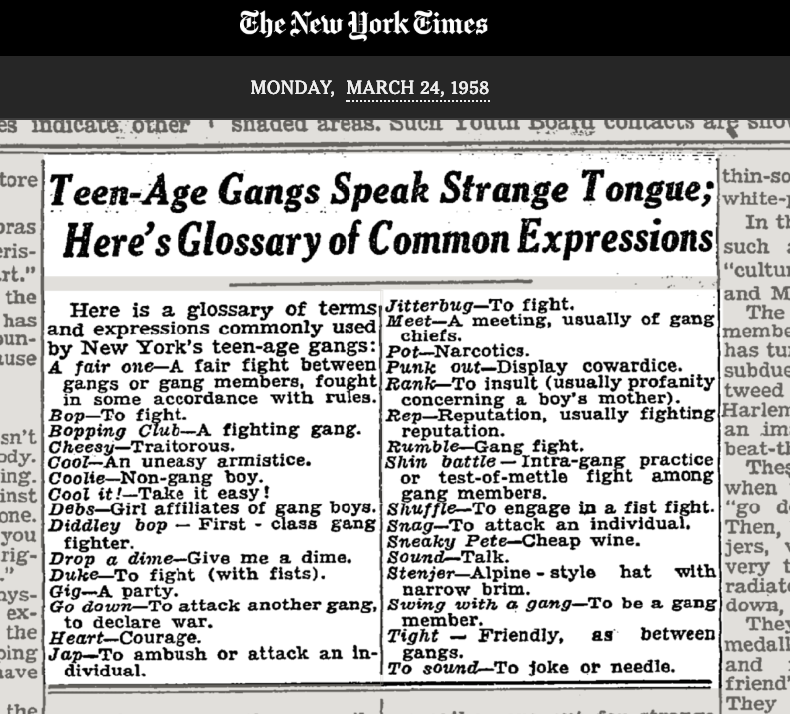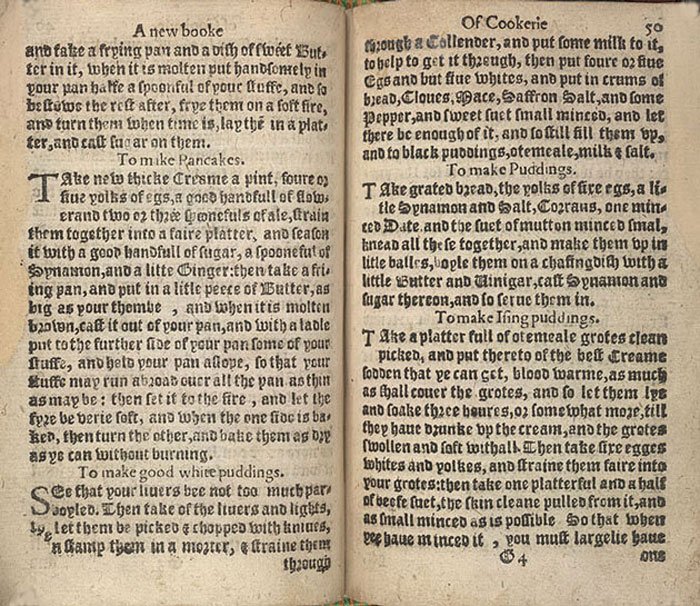
How could an obscure, elderly linguist have anything relevant to contribute to the debate now – belatedly – taking place on knife crime in the UK? It is many many years since I hung out, ineffectually feigning menace, with a gang of suburban mods (in the days when ‘bovver boots’ were the only dangerous item of subcultural paraphernalia), many years since I taught in an inner city London school and watched as younger teens gradually became disaffected and detached from family life and adult society. Much later I investigated and wrote about the successive waves of tribal youth culture – hippies, neo-teddy boys, punks, new romantics, rave aficionados, hiphop enthusiasts and the rest – who occupied the space reserved for ‘folk devil’ in the periodic ‘moral panics’ that the grownup public, with the help of the media, has always indulged in.
I was always interested in the outward signs and symbols, the accessories and the poses that these groups used to design and to project their identities, simultaneously signalling their belonging and their rejection of outsiders. I was more than anything interested in the special language that they used, generally characterised as ‘slang’, to communicate with one another and to baffle and dismay their perceived enemies – parents, teachers, the forces of social conformity in general.
It’s only by deciphering and understanding this sort of language – or rather these languages – that we can hope to enter the world of peer-groups, in-groups and gangs, to come to make sense of their rituals and obsessions, their thoughts and feelings. I have collected the slangs of adults and of younger speakers operating in all sorts of contexts, publishing a succession of dictionaries and articles over the years and teaching and broadcasting about these and other ‘nonstandard’ and controversial areas of language such as business jargon, fashion and lifestyle buzzwords and the ‘weasel words’ of politicians.

I wrote last year about the distressing, frightening language used by members of street gangs who identify with the Drill music genre, and on this site you can find my updated dictionary of the terms they and their followers and imitators use, terms which many other quite innocent and uninvolved young people will be familiar with, but which are alien and incomprehensible to most adults. There are links to news articles accompanying the Drill Dictionary, and other articles on youth slang and so-called MLE on this site too.
https://language-and-innovation.com/2018/04/19/a-drill-dictionary/
The phenomenon of Drill, to a lesser extent of Grime music and the gangs who use their style of rap and hiphop songwriting and recording, is so closely linked to the knife crime ‘epidemic’ that is being discussed as I write, that the connection can’t be downplayed or ignored. Today’s gangs, with their territorial disputes, drug-based economies and hypermasculine culture of bragging and ‘dissing’ differ from earlier incarnations in that they declare their allegiances and flaunt their activities semi-publicly online, using messaging, social media platforms and video recording.

I’m not of course suggesting that all the disturbing messages being exchanged by the gangs are accurate or sincere, or that the knifings and shootings they boast about have all really taken place. But I would propose very forcefully that anybody who is trying to analyse or engage with their behaviour must analyse and engage with what they themselves are saying and the language they use.
My own take on this is not just that of an interested outsider. For a decade now, and increasingly over the last five years I have been helping the police forces who are trying to control street crime and the lawyers who are defending those accused (nearly all of them teenagers). My task as a language analyst and an expert witness is to translate and comment on the slang terminology found on confiscated mobile phones, obtained by surveillance and electronic intercepts, or used in the course of live interviews. I’ve found that the officers in question and the legal representatives are dedicated, unprejudiced, painstaking and privately appalled at what they witness day-to-day. They may become familiar with the exotic, distressing language they are exposed to, but they require an expert objectively to interpret and assess the written or recorded evidence they work with, if necessary, too, to stand in court and testify on their or their clients’ behalf.
There are now a number of experts on the ‘multiethnolects’, the new urban speech patterns prevalent among younger speakers that mix elements of native and minority languages. Professor Paul Kerswill and Professor Jenny Cheshire were the first to name the phenomenon as MLE – multicultural London English – and have written extensively on it. There are also expert forensic linguists, such as Professor Tim Grant of Aston University, who employ linguistic methods in the analysis of criminal language, enabling them for instance to identify authorship and authenticity of anonymous messages and online communications by paedophiles and others. My own claim to expertise is that I am one of very few who focuses on up-to-date slang and on items of criminal vocabulary (the deliberately secret languages known as ‘cryptolects’), rather than the scientific analysis of longer sequences of speech or text.
In looking at recordings of gang member’s conversations, for example, it’s crucial to know that a burner is a handgun; dotty means shotgun, Rambo, ramsey, shank or nank is knife. When looking at jottings in a teenager’s notebook or listening to a hardcore Drill track recorded by a gang associate it’s essential to identify trap as a term for selling drugs or the location where it takes place, plug as a drug source, dip as stab, op as enemy, duppy as kill, dasheen as run away. The same words, catchphrases and slogans are shared across London and into other UK centres: the same mindset with its obsession with respect, its reverence for violence and its cruel bravado seems to apply everywhere.
Among the voices raised in the latest debate, Akala’s stands out as representing real experience of, and sympathy for the victims and perpetrators. I only feel that he underestimates the levels of violence tolerated and celebrated, the extent of the ill-gotten wealth and the technical sophistication of the gangs of today. Rappers routinely claim that their lyrics are a fictional reflection of an imagined street life, a poetic evocation of rage and intensity rather than a call to arms, but the words written by young knife-carriers that I have had to translate are exactly the same words used by the rappers. In some cases the rapper is the perpetrator – the killer himself. The young people living in the postcodes most affected by knife crime are of course dealing with the new reality every day, as explained here.
Beyond the gangs young people are speaking and writing and broadcasting about the pressures and oppressions of urban lifestyles. A good example is the short film on the inner city life, Drawn Out.
https://www.youtube.com/watch?v=9OEuq5szR7I
And in March 2020 London school students dramatised the issue on stage.
Knife crime is intimately bound up with gang slang and vice versa. To try to understand the killings and the woundings and their perpetrators and victims without understanding what they themselves are saying makes tackling the hugely complex problem much more difficult.
As a footnote, I have had a lot of very interesting and constructive feedback (suggestions, criticisms, donations of new terms) arising from this article and from my broadcast on the same subject on Voice of Islam radio. I also discussed all the issues involved with Rob Booth, Social Affairs Correspondent of the Guardian, who has published several insightful articles on innercity stress and street crime. His piece is here…
From October 2019, news of a case that I was not involved with…
An update: in August 2020 the Sun newspaper reported on the new use of TikTok to post gang videos. Despite the sensationalist format the substance of the article is accurate…
https://www.thesun.co.uk/news/12535332/tiktok-gang-violence-drill-music-oj-profile-scorecards/
**Please do contact me if you can supply examples of street slang for my databases. Contact me too if you need to interpret street talk or criminal slang yourself, or if you would like me to contribute to projects in this area.**
In May 2022 the London Review of Books reviewed Ciaran Tharpar‘s memoir of his time as a youth worker in South London and his experience of the gang milieu…
https://www.lrb.co.uk/the-paper/v44/n09/daniel-trilling/now-he-had-opps
Finally, as proof that Akala is right and that press stories on gangs are nothing new, this from 1958…



